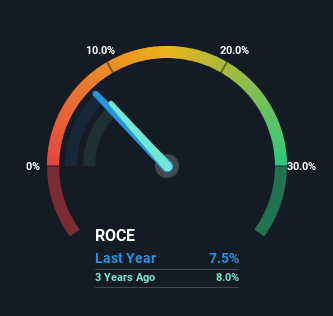- China
- /
- Metals and Mining
- /
- SZSE:000960
Investors Could Be Concerned With Yunnan Tin's (SZSE:000960) Returns On Capital

If we want to find a stock that could multiply over the long term, what are the underlying trends we should look for? In a perfect world, we'd like to see a company investing more capital into its business and ideally the returns earned from that capital are also increasing. Put simply, these types of businesses are compounding machines, meaning they are continually reinvesting their earnings at ever-higher rates of return. In light of that, when we looked at Yunnan Tin (SZSE:000960) and its ROCE trend, we weren't exactly thrilled.
What Is Return On Capital Employed (ROCE)?
For those that aren't sure what ROCE is, it measures the amount of pre-tax profits a company can generate from the capital employed in its business. The formula for this calculation on Yunnan Tin is:
Return on Capital Employed = Earnings Before Interest and Tax (EBIT) ÷ (Total Assets - Current Liabilities)
0.075 = CN¥2.2b ÷ (CN¥37b - CN¥7.8b) (Based on the trailing twelve months to December 2023).
Therefore, Yunnan Tin has an ROCE of 7.5%. On its own, that's a low figure but it's around the 6.6% average generated by the Metals and Mining industry.
See our latest analysis for Yunnan Tin

Above you can see how the current ROCE for Yunnan Tin compares to its prior returns on capital, but there's only so much you can tell from the past. If you'd like, you can check out the forecasts from the analysts covering Yunnan Tin for free.
What Does the ROCE Trend For Yunnan Tin Tell Us?
On the surface, the trend of ROCE at Yunnan Tin doesn't inspire confidence. Around five years ago the returns on capital were 9.9%, but since then they've fallen to 7.5%. Given the business is employing more capital while revenue has slipped, this is a bit concerning. This could mean that the business is losing its competitive advantage or market share, because while more money is being put into ventures, it's actually producing a lower return - "less bang for their buck" per se.
On a side note, Yunnan Tin has done well to pay down its current liabilities to 21% of total assets. So we could link some of this to the decrease in ROCE. What's more, this can reduce some aspects of risk to the business because now the company's suppliers or short-term creditors are funding less of its operations. Since the business is basically funding more of its operations with it's own money, you could argue this has made the business less efficient at generating ROCE.
In Conclusion...
From the above analysis, we find it rather worrisome that returns on capital and sales for Yunnan Tin have fallen, meanwhile the business is employing more capital than it was five years ago. Investors must expect better things on the horizon though because the stock has risen 35% in the last five years. Either way, we aren't huge fans of the current trends and so with that we think you might find better investments elsewhere.
If you'd like to know about the risks facing Yunnan Tin, we've discovered 1 warning sign that you should be aware of.
While Yunnan Tin may not currently earn the highest returns, we've compiled a list of companies that currently earn more than 25% return on equity. Check out this free list here.
New: Manage All Your Stock Portfolios in One Place
We've created the ultimate portfolio companion for stock investors, and it's free.
• Connect an unlimited number of Portfolios and see your total in one currency
• Be alerted to new Warning Signs or Risks via email or mobile
• Track the Fair Value of your stocks
Have feedback on this article? Concerned about the content? Get in touch with us directly. Alternatively, email editorial-team (at) simplywallst.com.
This article by Simply Wall St is general in nature. We provide commentary based on historical data and analyst forecasts only using an unbiased methodology and our articles are not intended to be financial advice. It does not constitute a recommendation to buy or sell any stock, and does not take account of your objectives, or your financial situation. We aim to bring you long-term focused analysis driven by fundamental data. Note that our analysis may not factor in the latest price-sensitive company announcements or qualitative material. Simply Wall St has no position in any stocks mentioned.
About SZSE:000960
Yunnan Tin
Engages in the production, processing, and export of tin in China and internationally.
Flawless balance sheet, undervalued and pays a dividend.


